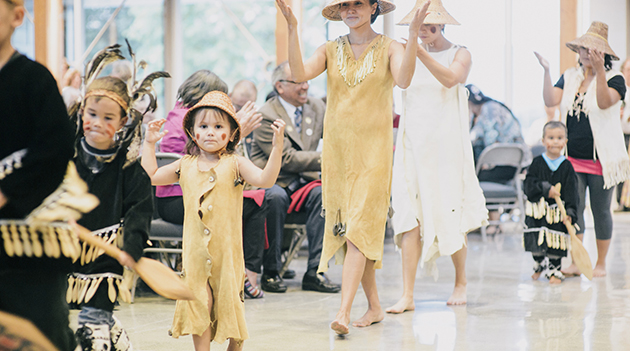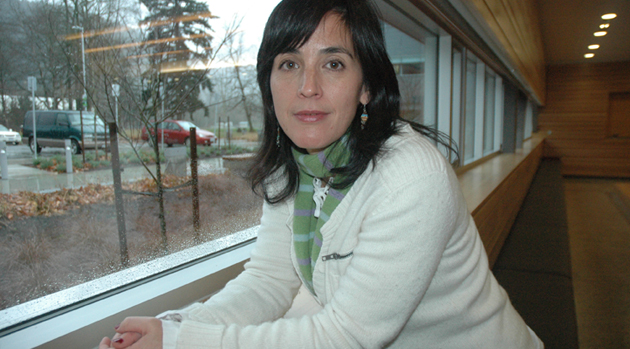UFV to host Indian Residential School Day of Learning on Sept 18
 Regular classes are being replaced with something quite different at the University of the Fraser Valley on Wednesday, September 18. The university has transformed its curriculum for that day, so that students, along with the rest of the campus community, can gather together for the Indian Residential School Day of Learning.
Regular classes are being replaced with something quite different at the University of the Fraser Valley on Wednesday, September 18. The university has transformed its curriculum for that day, so that students, along with the rest of the campus community, can gather together for the Indian Residential School Day of Learning.
The day-long collection of learning events, on-going displays, and interactive activities is being held in conjunction with the Truth and Reconciliation Commission (TRC) national event in Vancouver, which runs Sept. 18–21. The Truth and Reconciliation Commission of Canada has a federally assigned mandate to learn the truth about what happened in the Indian residential schools and to inform all Canadians about it.
The Commission’s website notes that the TRC hopes to guide and inspire First Nations, Inuit, and Métis peoples and Canadians in a process of truth and healing leading toward reconciliation and renewed relationships based on mutual understanding and respect. A slogan that explains the motivation behind the TRC states that the process is “for the child taken; for the parent left behind.”
UFV wants to give all students and employees the chance to learn more about this aspect of Canadian history, and how it still impacts Canadian society today, by taking part in events scheduled for several UFV locations on September 18. The decision to transform the curriculum for this one-day event was approved by the UFV Senate at its June meeting. The general public is also welcome to attend these free events.
“We believe that it is our responsibility as a university to participate and show leadership in the process of examining, discussing, reflecting upon, and healing the wound in our national fabric caused by the legacy of the residential school system,” said UFV provost and VP academic and Eric Davis. “We look forward to bringing the UFV community together for one day as we take responsibility for understanding the history and legacy of the residential school experience, and move forward together to build awareness and reconciliation.”
Events at UFV on that day will include a keynote address titled Schooled for Inequality by Dr. Jean Barman, a historian with specialties in the history of education and B.C. history; a presentation from UFV alumnus Dallas Yellowfly and 3 Crow Productions about the experiences of local residential school survivors; displays about Coqualeetza, St. Mary’s and other residential schools; areas where participants can express themselves through art and writing; and a slideshow of photos related to the residential school experiences. Film screenings, presentations, and readings will run throughout the day at various UFV locations in Abbotsford, Chilliwack, Mission, and Hope.
The 3 Crows presentation conveys its message through an interactive traditional mask storytelling and through sharing personal experiences. Local elders share the life-changing experiences they had while attending St. Mary’s Indian Residential School in Mission. They focus on building an understanding within the entire community about the effects of the residential school system for First Nations and non-Aboriginal people. There will also be an opening ceremony with a theme of Pulling Together towards understanding and harmony at the Chilliwack campus at Canada Education Park at 8:30 am, and a celebration ceremony with a Sto:lo dance group at the Abbotsford campus at 4 pm.
 Wenona Victor is a faculty member at UFV who teaches Indigenous Studies. She is helping to organize events for the September 18 day of learning, including the opening and end-of-day ceremonies, and two of the workshops. She is pleased to see the entire university turning its attention to the legacy of residential schools.
Wenona Victor is a faculty member at UFV who teaches Indigenous Studies. She is helping to organize events for the September 18 day of learning, including the opening and end-of-day ceremonies, and two of the workshops. She is pleased to see the entire university turning its attention to the legacy of residential schools.
“There is a misconception out there that this is only First Nations history. It is part of Canadian history. All Canadians have a responsibility to learn about what happened in the residential schools. Doing so will help the general population understand First Nations people better,” she says. “There are still a lot of misconceptions, negativity, and hostility towards First Nations people. This is a positive step towards building a more authentic relationship. When we understand each other better we can move forward together.”
The residential school experience had a profound effect on indigenous people in Canada. The government-funded, church-run residential schools were set up to eliminate parental involvement in the intellectual, cultural, and spiritual development of Aboriginal children. The system was active from the 1870s through the end of the 20th century. Generations of Aboriginal children were compelled to attend the 130 residential schools across the country, two of which — Coqualeetza and St. Mary’s — were located in the Fraser Valley.
More than 150,000 children were placed in these schools over the more than 100 years that they existed; 80,000 are thought to be still living today. Much information has come out over the past few decades about the mental, emotional, physical, and sexual abuse that took place within these schools. Even children who did not experience direct abuse were affected by being wrenched from their family and home community at a young age. And those who returned to the community as adults did not know how to function as a traditional member of their society.
In 2008, Prime Minister Stephen Harper issued a formal apology on behalf of the Government of Canada to the survivors of residential schools, stating: “This policy of assimilation was wrong, has caused great harm, and has no place in our country.”
Peter Geller, UFV vice-provost and associate VP academic, says that the goals of the day include raising awareness of the two residential schools that operated in the Fraser Valley (St. Mary’s in Mission, and Coqualeetza in Chilliwack), and the legacy of the experiences in these schools; and promoting knowledge of and respect for Aboriginal history, language, culture, values, and Indigenous ways of knowing in relation to the Indian Residential School experience, and related contemporary issues.
He notes learning outcomes that were developed for the Day of Learning will help to ensure that students from every program at UFV will gain valuable insight from spending the day learning about and reflecting upon the legacy of the residential schools.
“The legacy of the residential school system has an impact on the occupations that our graduates will be working in, including social work, teaching, counselling, nursing, early childhood education, medicine, research, criminal justice, the civil service, indigenous governance, economics, and business, to name a few. It is valuable for all of us to learn something about the long-term effects of taking generations of Aboriginal children away from their families and their culture. As this is a legacy that affects us all, we can benefit by learning and working together, coming together as Aboriginal and non-Aboriginal peoples.”
For a full schedule of events, see www.ufv.ca/day-of-learning .





